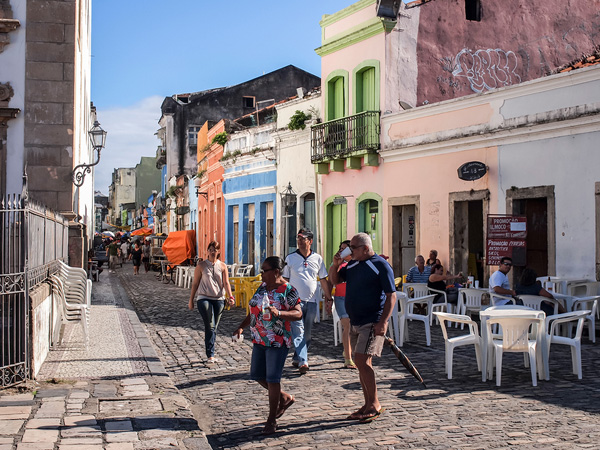Having a Baby in Brazil
Summary: If you're going to be pregnant while living in Brazil and want to learn what it's like to have a baby in Brazil, this article is a must read. Topics covered include public vs. private hospitals, pain management, finding a doctor and more. Plus, expats share their experiences having a baby in Brazil.

Having a baby in a foreign country can be a daunting prospect, but Brazil offers a unique experience for expats and digital nomads who find themselves expecting a child during their stay. The country's vibrant culture and warm people can make for a welcoming environment, but navigating the healthcare system may present challenges. From choosing the right doctor to understanding the healthcare system, expats will need to prepare for a different set of procedures and expectations compared to what they might be used to back home. This article aims to provide an overview of what it's like for an expat to have a baby in Brazil, covering key aspects such as medical care, insurance, hospital choices, and more.
Choosing a Doctor
When expecting a baby in Brazil, finding the right healthcare provider is crucial. Expats should look for a gynecologist-obstetrician (GO) who can manage their pregnancy. It is possible to find English-speaking doctors, especially in larger cities like São Paulo and Rio de Janeiro, where there is a higher concentration of expats. However, in smaller towns and rural areas, English-speaking doctors may be few and far between. Expats can ask for recommendations from local expat communities, consult the embassy or consulate, or use online platforms and forums to find a suitable doctor. Some private healthcare providers have bilingual staff to assist foreign patients. It's important to start this search early to ensure a good fit and to establish a relationship with the healthcare provider.
What to Expect for Prenatal Care
Prenatal care in Brazil typically includes regular check-ups, ultrasound scans, and blood tests to monitor the health of both mother and baby. The frequency of these appointments may increase as the pregnancy progresses. Brazilian healthcare providers place a strong emphasis on prenatal care, and expectant mothers can expect thorough monitoring throughout their pregnancy. Private healthcare often offers more personalized and comprehensive prenatal services compared to the public system, which can sometimes be overstretched.
Do Expats Typically Have Private Health Insurance when Having a Baby in Brazil?
Many expats opt for private health insurance when having a baby in Brazil. The private healthcare system generally provides a higher standard of care, shorter wait times, and more comfortable facilities. Expats working in Brazil may have health insurance provided by their employer, but those who are self-employed or do not have coverage through work will need to purchase private insurance. It is advisable to check whether maternity care is included in the insurance policy, as some plans may require a waiting period before maternity costs are covered.
Giving Birth at Public vs. Private Hospitals
The experience of having a baby at a private hospital in Brazil is often more akin to what expats might expect in their home countries, with modern facilities and a higher staff-to-patient ratio. Private hospitals are more likely to cater to specific birthing plans and provide private rooms. On the other hand, public hospitals are accessible to everyone but may have limited resources and longer wait times. The quality of care can vary significantly from one public hospital to another. Expats with private insurance typically choose private hospitals for childbirth to ensure a more comfortable experience and a higher level of care.
C-Sections in Brazil
Cesarean sections are very common in Brazil, with one of the highest rates in the world. Many women opt for a C-section for various reasons, including convenience and fear of pain during childbirth. Some private hospitals have particularly high C-section rates, and expats may feel pressure to conform to this norm. However, there is a growing movement towards natural childbirth, and expectant mothers can find support for vaginal births if they prefer. It's important for expats to discuss their birth plan with their doctor early on.
Pain Management During Delivery
Pain management during delivery in Brazil varies depending on the hospital and the expectant mother's birth plan. Epidurals are widely available in private hospitals, and many women choose this method for pain relief. In public hospitals, the availability of epidurals and other pain management options may be more limited due to resource constraints. It's essential for expats to discuss pain management options with their healthcare provider well in advance of the delivery date.
Hospitals with Neonatal Intensive Care Units
Hospitals with neonatal intensive care units (NICUs) are primarily found in larger cities in Brazil, such as São Paulo, Rio de Janeiro, Belo Horizonte, and Porto Alegre. These facilities are equipped to handle high-risk pregnancies and any complications that may arise during childbirth. Expats living in or near major urban centers will have better access to these specialized services. It's advisable for expectant mothers to choose a hospital with a NICU if they have a high-risk pregnancy or simply want to ensure the best possible care for their newborn.
Expats Talk about Having a Baby in Brazil
"I had my baby at Pro Matre cause Albert Einstein was full, but I dont regret it. We dont use any kind of health insurance, so we payed ir from our pockets. I spent 6 days there, 2 on ICU. And my daughter 12 days, all of them on neo ICU. I had all the support I need, even psychological care. The staff is great, and gives a lot of help with whatever we need," commented an expat living in Sao Paulo.
"Get the best health insurance you can, cause having a baby in Brazil is really expensive, especially if your pregnancy is considered risky," said one expat living in Sao Paulo.
About the Author
 Joshua Wood, LPC joined Expat Exchange in 2000 and serves as one of its Co-Presidents. He is also one of the Founders of Digital Nomad Exchange. Prior to Expat Exchange, Joshua worked for NBC Cable (MSNBC and CNBC
Primetime). Joshua has a BA from Syracuse and a Master's in Clinical and Counseling Psychology from Fairleigh Dickinson University. Mr. Wood is also a licensed counselor and psychotherapist.
Joshua Wood, LPC joined Expat Exchange in 2000 and serves as one of its Co-Presidents. He is also one of the Founders of Digital Nomad Exchange. Prior to Expat Exchange, Joshua worked for NBC Cable (MSNBC and CNBC
Primetime). Joshua has a BA from Syracuse and a Master's in Clinical and Counseling Psychology from Fairleigh Dickinson University. Mr. Wood is also a licensed counselor and psychotherapist.
Some of Joshua's articles include Pros and Cons of Living in Portugal, 10 Best Places to Live in Ireland and Pros and Cons of Living in Uruguay. Connect with Joshua on LinkedIn.
Additional Information:
- Brazil Guide
- Healthcare & Health Insurance in Brazil
- Members Talk about Healthcare & Health Insurance in Brazil
- Best Places to Live in Brazil
- Real Estate in Brazil
- Guide to Real Estate in Brazil
- Pros & Cons of Living in Brazil
- Cost of Living in Brazil
- Christmas in Brazil
- Dengue Virus in Brazil
- Culture Shock in Brazil
- Homeschooling in Brazil
- 2025 Guide to Living in Brazil
- Pros and Cons of Living in Brazil 2025



